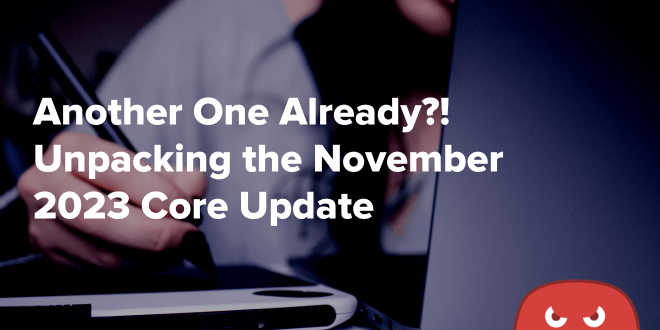Quick Links
On November 2nd, 2023, Google began rolling out its latest core algorithm update.
It comes right on the heels of October’s core update, which started on October 5th and completed on the 19th.
October’s update was a bit rough, as Google discovered a bug that was messing with traffic on Google Discover.
Some speculated that the bug was due to preparations for the November update.
However, John Mueller dispelled this myth on Twitter, claiming the two were unrelated and that the Discover bug was resolved on October 31st.
The November update is the fourth core algorithm update of 2023, with the others occurring in March, August, and October.
What’s new with this update?
As usual, Google was pretty tight-lipped about the process but stated that the update “deals with making improvements to a different core system than last month.”
This means it’s safe to say that November’s update has nothing to do with Google Discover.
If you saw a dip in your Discover traffic due to last month’s update, your traffic should recover over the next few weeks.
As with other core updates, it will take roughly two weeks for it to complete rolling out, which should occur around November 17th.
To learn more about this core update and what to do if your site is affected, stay tuned.
Understanding Core Updates
Google updates its core algorithm several times a year with the hopes of improving its automated systems that rank search results.
Core updates also serve as a ‘refresh button’ of sorts for Google’s SERPs (search engine results pages).
How’s that?
It’s because Google reranks its search results during core updates with the hopes of rewarding websites that adhere to its quality standards.
Google often compares its core updates to ‘best-of-the-year’ movie lists online.
The best movies of 2021 will look different than the best movies of 2022 for the simple fact that more movies were released.
Google’s SERPs work in the same way.
Every few months, new websites emerge on the scene, while others improve the quality of their content and better optimize for Google’s algorithm.
As such, some websites will benefit from core updates, while others won’t.
However, the sites that see ranking drops from core updates shouldn’t get discouraged, as it doesn’t mean that they’ve done anything wrong.
In other words, it’s not personal; it’s just business.
Google always prefers websites that reflect its quality rater guidelines, namely E-E-A-T (experience, expertise, authoritativeness, and trustworthiness).
So, if you lose a rank or two after a core update, it doesn’t mean you were penalized; it means that your competition is doing something right (more on what to do if your site sees a negative impact in a bit).
Why the Need for Another Update So Soon?
The folks at Google have been extremely busy lately, with three core algorithm updates occurring in very close proximity (August, October, and November).
They recently released a Q&A covering their recent updates, including why they chose to launch another core update just two weeks after the October update finished rolling out.
According to Google, different systems are core to their ranking process, and November’s update deals with a different system than last month.
At the same time, they claim that their guidance for dealing with both remains the same.
They also clarify the distinction between a ranking system and a ranking update.
In a nutshell, ranking systems are what they use to generate search results, and Google uses numerous ranking systems for various things.
A ranking update occurs whenever Google makes tweaks, improvements, or modifications to one or more ranking systems.
Is Google increasing its number of updates each year?
Another question Google addresses is if they’ve been doing more updates than usual. It’s pretty easy to see why SEOs are asking this question, given the fact there have been so many core updates lately.
However, as Google states in the Q&A, the number of updates has remained pretty consistent in recent years. There were 10 major updates in 2021, another 10 in 2022, and there’s set to be around the same this year.
It’s also crucial to note that Google is always tweaking and changing its algorithm throughout the year (literally THOUSANDS of times), even when they don’t announce it. These are typically small adjustments that only lead to tiny changes, which is why they don’t go public with the information.
They only announce updates that they feel are notable and will produce significant changes to Google’s search results.
What to Do if a Core Update Impacts Your Website
Now that you know what core updates are all about, what does the mighty Google recommend you do to recover any negative impacts from them?
Create better content.
Wait, that’s all?
There has to be more, right?
Unfortunately, no, as there are no specific actions you need to take to recover besides improving the overall quality of your content.
The reason why has to do with the nature of core updates. Remember, these updates don’t target anything in particular (like spam or dishonest product reviews), as they only exist to improve the quality of Google’s search results.
If you dropped a few positions, it’s a sign that other websites in your space have upped their SEO game and that you need to follow suit if you want to remain competitive.
In the past, Google has provided a list of questions to ask yourself in order to improve your content, which you can find here. These types of questions include the following:
- Does the content provide original research, analysis, or information?
- Is the content unique from other articles on the same topic?
- Does the content provide a comprehensive overview of the topic that goes beyond what’s obvious?
These questions can certainly help you improve the quality and rankability of your content, so they’re a good resource.
Besides that, you should also adhere to E-E-A-T as closely as possible when creating content. That means adding first-hand experiences, demonstrating your expertise, and linking to authoritative and trustworthy sources.
Keep Up with All Google Updates with The HOTH
Why is it crucial to keep up with Google core updates?
It is for lots of reasons, but the main one is to remain aware of any possible changes to your SERP rankings.
By staying up to date with Google’s updates, you’ll be able to pinpoint the reason for any ranking drops or changes to your traffic – which definitely beats scratching your head in confusion.
We keep up with all the latest algorithm updates at The HOTH, as we feature a complete history of all Google updates.
If you need help recovering your SERP rankings from a Google core update, don’t wait to sign up for HOTH X, our renowned managed SEO service.








Dear Rachel,
I read your article with great interest and learned al lot.
Regards
Philipp S.
Thanks for indepth article regarding google core updates.